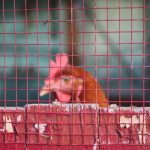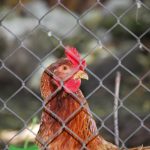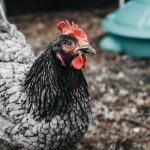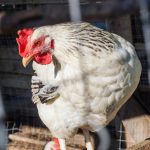Insulating the coop is crucial for maintaining a comfortable and healthy environment for your birds, especially during the colder months. Proper insulation helps to regulate the temperature inside the coop, keeping it warm in the winter and cool in the summer. There are several options for insulating a coop, including using foam board, fiberglass insulation, or even recycled denim insulation. It’s important to ensure that the insulation is installed properly and securely to prevent any potential hazards to the birds. Additionally, sealing any gaps or cracks in the coop walls and windows can also help to improve insulation and keep the coop draft-free.
Another important aspect of insulating the coop is to consider the flooring. Adding a layer of insulation under the floor can help to prevent cold air from seeping in from below. This can be achieved by using materials such as straw, hay, or even foam board. It’s important to regularly check and replace any insulation materials to ensure they remain effective over time. By insulating the coop properly, you can create a comfortable and safe environment for your birds year-round.
Proper insulation is essential for maintaining a comfortable and healthy environment for your birds. Insulating the coop helps to regulate the temperature inside, keeping it warm in the winter and cool in the summer. There are various options for insulating a coop, including using foam board, fiberglass insulation, or recycled denim insulation. It’s important to ensure that the insulation is installed securely and that any gaps or cracks in the coop walls and windows are sealed to prevent drafts. Additionally, adding insulation under the floor can help prevent cold air from seeping in from below. By insulating the coop properly, you can create a comfortable and safe environment for your birds year-round.
Table of Contents
Provide Proper Ventilation
Proper ventilation is essential for maintaining good air quality inside the coop and preventing the buildup of harmful gases such as ammonia. Adequate ventilation helps to remove excess moisture, odors, and airborne pathogens, creating a healthier environment for your birds. It’s important to ensure that the coop has enough vents or windows to allow for proper air circulation without creating drafts. Installing vents near the roof or eaves can help to facilitate the escape of warm, moist air while preventing cold drafts from entering the coop.
In addition to natural ventilation, you may also consider using mechanical ventilation systems such as exhaust fans or air vents to help improve air circulation inside the coop. These systems can be especially beneficial during periods of extreme weather when natural ventilation may be insufficient. Regularly cleaning and maintaining vents and fans is important to ensure they remain effective in providing proper ventilation for your birds. By providing proper ventilation, you can help to create a healthier and more comfortable living environment for your flock.
Proper ventilation is crucial for maintaining good air quality inside the coop and preventing the buildup of harmful gases such as ammonia. Adequate ventilation helps to remove excess moisture, odors, and airborne pathogens, creating a healthier environment for your birds. It’s important to ensure that the coop has enough vents or windows to allow for proper air circulation without creating drafts. Installing vents near the roof or eaves can help facilitate the escape of warm, moist air while preventing cold drafts from entering the coop. In addition to natural ventilation, you may also consider using mechanical ventilation systems such as exhaust fans or air vents to help improve air circulation inside the coop. Regularly cleaning and maintaining vents and fans is important to ensure they remain effective in providing proper ventilation for your birds.
Use Deep Bedding
Using deep bedding in the coop is an effective way to provide insulation, absorb moisture, and control odors. Deep bedding consists of a thick layer of materials such as straw, hay, wood shavings, or shredded paper that is spread on the floor of the coop. As the bedding decomposes, it generates heat which helps to keep the coop warm during colder months. Additionally, deep bedding absorbs moisture from droppings and spills, helping to keep the coop dry and reducing the risk of respiratory issues in your birds.
Regularly turning and fluffing the bedding helps to aerate it and prevent the formation of ammonia from decomposing waste. Adding fresh bedding on top of the existing layer as needed can help to maintain a clean and comfortable living environment for your birds. It’s important to regularly monitor and replace bedding as it becomes soiled or begins to break down. By using deep bedding in the coop, you can provide a comfortable and healthy living environment for your flock.
Using deep bedding in the coop is an effective way to provide insulation, absorb moisture, and control odors. Deep bedding consists of a thick layer of materials such as straw, hay, wood shavings, or shredded paper that is spread on the floor of the coop. As the bedding decomposes, it generates heat which helps to keep the coop warm during colder months. Additionally, deep bedding absorbs moisture from droppings and spills, helping to keep the coop dry and reducing the risk of respiratory issues in your birds. Regularly turning and fluffing the bedding helps to aerate it and prevent the formation of ammonia from decomposing waste. Adding fresh bedding on top of the existing layer as needed can help maintain a clean and comfortable living environment for your birds.
Offer Warm Water and Nutritious Food
Providing warm water and nutritious food is essential for keeping your birds healthy and comfortable during colder months. Birds need access to fresh water at all times, so it’s important to regularly check waterers for freezing and provide warm water as needed. Using heated waterers or adding warm water to existing waterers can help prevent water from freezing in cold temperatures. Additionally, offering warm water can help to raise body temperature and keep birds hydrated during chilly weather.
In addition to warm water, providing nutritious food is crucial for maintaining your birds’ health during colder months. Birds require extra energy to stay warm in cold weather, so offering high-quality feed with added protein and fat can help meet their nutritional needs. Consider supplementing their diet with treats such as mealworms, cracked corn, or black oil sunflower seeds to provide additional energy during colder months. It’s important to regularly check feeders and ensure they are filled with fresh food to keep your birds well-nourished throughout the winter.
Providing warm water and nutritious food is essential for keeping your birds healthy and comfortable during colder months. Birds need access to fresh water at all times, so it’s important to regularly check waterers for freezing and provide warm water as needed. Using heated waterers or adding warm water to existing waterers can help prevent water from freezing in cold temperatures. Additionally, offering warm water can help raise body temperature and keep birds hydrated during chilly weather. In addition to warm water, providing nutritious food is crucial for maintaining your birds’ health during colder months. Birds require extra energy to stay warm in cold weather, so offering high-quality feed with added protein and fat can help meet their nutritional needs.
Add Heat Sources
Adding heat sources to the coop can help maintain a comfortable temperature for your birds during colder months. There are several options for providing heat in the coop, including heat lamps, radiant heaters, or heated perches. It’s important to carefully select heat sources that are safe for use around birds and follow manufacturer recommendations for installation and operation.
When using heat lamps or radiant heaters, it’s crucial to ensure they are securely mounted and positioned away from flammable materials such as bedding or feathers. Additionally, using thermostats or temperature sensors can help monitor and regulate the temperature inside the coop to prevent overheating or potential fire hazards. Providing supplemental heat sources can help keep your birds warm and comfortable during colder months while reducing their energy expenditure.
Adding heat sources to the coop can help maintain a comfortable temperature for your birds during colder months. There are several options for providing heat in the coop, including heat lamps, radiant heaters, or heated perches. It’s important to carefully select heat sources that are safe for use around birds and follow manufacturer recommendations for installation and operation. When using heat lamps or radiant heaters, it’s crucial to ensure they are securely mounted and positioned away from flammable materials such as bedding or feathers. Additionally, using thermostats or temperature sensors can help monitor and regulate the temperature inside the coop to prevent overheating or potential fire hazards.
Check for Drafts
Checking for drafts in the coop is essential for maintaining a comfortable living environment for your birds during colder months. Drafts can cause temperature fluctuations inside the coop, leading to discomfort and potential health issues for your flock. It’s important to carefully inspect all windows, doors, vents, and other openings in the coop for any signs of drafts.
Sealing any gaps or cracks with weather-stripping or caulking can help prevent cold air from entering the coop while still allowing for proper ventilation. Additionally, using draft guards or curtains on windows and doors can help further reduce drafts while still allowing natural light into the coop. Regularly checking for drafts and making necessary repairs can help create a cozy and draft-free environment for your birds year-round.
Checking for drafts in the coop is essential for maintaining a comfortable living environment for your birds during colder months. Drafts can cause temperature fluctuations inside the coop, leading to discomfort and potential health issues for your flock. It’s important to carefully inspect all windows, doors, vents, and other openings in the coop for any signs of drafts. Sealing any gaps or cracks with weather-stripping or caulking can help prevent cold air from entering while still allowing for proper ventilation.
Monitor the Birds Regularly
Monitoring your birds regularly is crucial for ensuring their health and well-being throughout the year. During colder months, it’s especially important to keep an eye on your flock for any signs of distress or illness related to cold weather conditions. Checking on your birds daily allows you to observe their behavior, assess their overall condition, and address any potential issues promptly.
In addition to visual monitoring, it’s important to regularly clean and maintain the coop to ensure a clean and healthy living environment for your birds. This includes removing soiled bedding, cleaning waterers and feeders, and checking for any signs of pests or disease. By monitoring your birds regularly and maintaining a clean living environment, you can help ensure their health and comfort throughout colder months.
Monitoring your birds regularly is crucial for ensuring their health and well-being throughout the year. During colder months, it’s especially important to keep an eye on your flock for any signs of distress or illness related to cold weather conditions. Checking on your birds daily allows you to observe their behavior, assess their overall condition, and address any potential issues promptly.
In addition to visual monitoring, it’s important to regularly clean and maintain the coop to ensure a clean and healthy living environment for your birds. This includes removing soiled bedding, cleaning waterers and feeders, and checking for any signs of pests or disease. By monitoring your birds regularly and maintaining a clean living environment, you can help ensure their health and comfort throughout colder months.
In conclusion, insulating the coop, providing proper ventilation, using deep bedding, offering warm water and nutritious food, adding heat sources, checking for drafts, and monitoring your birds regularly are all essential steps for keeping your flock healthy and comfortable during colder months. By taking these measures, you can create a cozy living environment that supports your birds’ well-being year-round. With proper care and attention to their needs, your flock can thrive even in chilly weather conditions.
Meet Walter, the feathered-friend fanatic of Florida! Nestled in the sunshine state, Walter struts through life with his feathered companions, clucking his way to happiness. With a coop that’s fancier than a five-star hotel, he’s the Don Juan of the chicken world. When he’s not teaching his hens to do the cha-cha, you’ll find him in a heated debate with his prized rooster, Sir Clucks-a-Lot. Walter’s poultry passion is no yolk; he’s the sunny-side-up guy you never knew you needed in your flock of friends!







